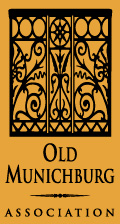"Old Munichburg" or "Muenchberg"?

The old German neighborhood on the south side of Jefferson City, Mo., that is now known as "Old Munichburg," was once known as "Muenchberg." Where did that name come from?
Although there have been rumors amongst our family that it was named after Friedrich and/or Georg, that is probably not true. In fact, according to Walter Schroeder of the Old Munichburg Association, there is irrefutable evidence that the name comes from the small town of Muenchberg in Oberfranken, northern Bavaria.
As we know, the name Muench means "monk" in German. The city that we call "Munich," which is the capital of Bavaria, is actually named "Muenchen" in German and means "city of monks." Likewise, a "berg" in German is a hill. So "Muenchberg" means "monk's hill."
"Muenchberg is Jefferson City's partner city, and several group exchanges have taken place in the last decade," Schroeder said. "I've traced the word "Muenchberg" as it was used in Jefferson City's German-language newspapers. It was still used as late as the 1920s."
Schroeder said the name got "corrupted" by English speakers who were unaware of the small place of origin of the early immigrants. But Americans knew about Munich, so they mistakenly called the neighborhood "Munichberg." The term "Munichburg" was brought back in the 1990s to connect with the historic past as redevelopment of the area began. But this time, even though Jefferson City is known for its hilly terrain, the community decided to spell it with the suffix "-burg," not "-berg," to indicate that it is an immigrant community unto itself, and not just a hill.
With their extensive involvement in Missouri politics, Friedrich and Georg Muench would have known this German immigrant section of Jefferson City well, especially since Friedrich served in the Missouri legislature during the Civil War.
Although there have been rumors amongst our family that it was named after Friedrich and/or Georg, that is probably not true. In fact, according to Walter Schroeder of the Old Munichburg Association, there is irrefutable evidence that the name comes from the small town of Muenchberg in Oberfranken, northern Bavaria.
As we know, the name Muench means "monk" in German. The city that we call "Munich," which is the capital of Bavaria, is actually named "Muenchen" in German and means "city of monks." Likewise, a "berg" in German is a hill. So "Muenchberg" means "monk's hill."
"Muenchberg is Jefferson City's partner city, and several group exchanges have taken place in the last decade," Schroeder said. "I've traced the word "Muenchberg" as it was used in Jefferson City's German-language newspapers. It was still used as late as the 1920s."
Schroeder said the name got "corrupted" by English speakers who were unaware of the small place of origin of the early immigrants. But Americans knew about Munich, so they mistakenly called the neighborhood "Munichberg." The term "Munichburg" was brought back in the 1990s to connect with the historic past as redevelopment of the area began. But this time, even though Jefferson City is known for its hilly terrain, the community decided to spell it with the suffix "-burg," not "-berg," to indicate that it is an immigrant community unto itself, and not just a hill.
With their extensive involvement in Missouri politics, Friedrich and Georg Muench would have known this German immigrant section of Jefferson City well, especially since Friedrich served in the Missouri legislature during the Civil War.
